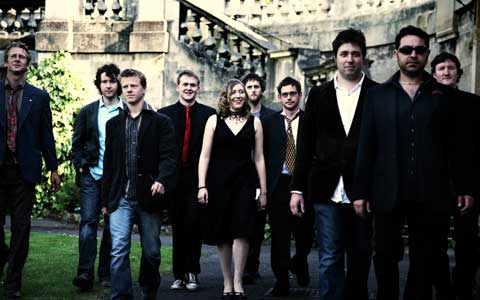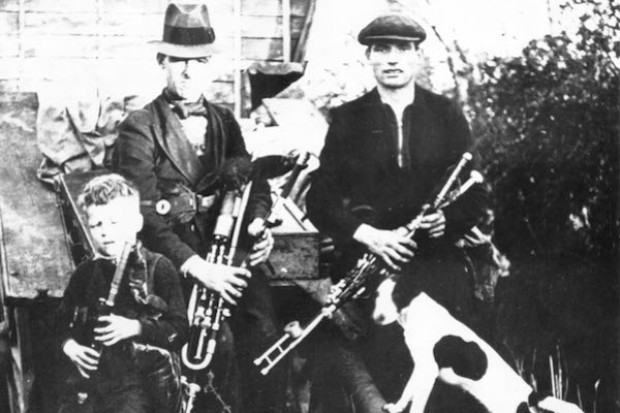
Bellowhead/Umbrellowhead
Just as Bellowhead’s music is itself a bricolage – the band seek to explore English folk traditions through a raucous brass-band format – so too is this album a mix of different traditions. Consisting of music made by members of Bellowhead under a variety of different guises (hence the cute name), the album brushes cheekily against an eclectic array of traditional and popular music styles from across the world.
The variety of the collection sometimes leads to unevenness in the quality and pacing, but this variety is nevertheless a virtue as much as it is a weakness. The listener will marvel at the colourful assemblage of musical styles, which range in the first few numbers alone from the skilfully controlled pidgin excitations of Bellowhead’s ‘Unclothed Nocturnal Manuscript Crisis’, to the tricksy, propulsive Bulgarian rhythms of Chavo’s ‘Ganka’s Song’ (with Andy Mellon dancing through on trumpet), and on into Rachel McShane’s electronic English balladry in ‘The Fisherman’, which she sings with a sweet tone and elegant line.
Pete Flood’s endearing homemade version of ‘Master Kilby’ is just one of a number of curios found in the collection. Flood’s lugubrious drawl and the wit and looseness of the arrangement reminded me of both Syd Barret and Robert Wyatt, and in fact the album connects with pop traditions at a number of points; Jon Boden’s louche way with a lyric on the otherwise rustic ‘Beating the Bounds’ (from his solo album Songs from the Floodplain) and ‘Tom Padget’ (from Vagabond, the duo album with John Spiers) strongly recalls Morrissey, whilst the charming frivolities of ‘Marunouchi’ and ‘Gujo Ondo’ evoke, respectively, Brian Wilson and the Focus Group on the one hand, and The Bonzo Dog Doo-Dah Band by way of Tokyo on the other.
Fidelity to the band’s folk ancestry is preserved more centrally elsewhere. Hannah James’ voice appears initially a little weak on ‘Gaol Song’, but it wears into the dirge well. James is shored up at every point by the incisive fiddle playing of Sam Sweeney. There’s a wonderful openness and humility to Faustus’ version of ‘The New Deserter’, whilst Spiers and Boden’s ‘Tom Padget’ is a masterclass in vocal ribaldry, and squeezebox and fiddle brio. The folk rigour of these performances is wedged between two pieces that relate in their distance from the main selection the free disposition generally invited of the listener: Justin Thurgur’s extended Afro-Latin jazz ‘The Beginning’ is supple and skilful in itself, but makes little musical sense in this context, whilst the Christ Church Cathedral Choir’s characteristically graceful performance of Paul Sartin’s Psalm 143 sounds equally incongruous. The nature of the collection accounts for and excuses such diversions, but the overall lack of cohesion which they engender makes for a sometimes-jarring listening experience.
Umbrellowhead, then, may ultimately go nowhere, it may amount to no more than the sum of its motley parts. But when the journey and the parts are as charming and as vibrant as they are here, it would surely be churlish to complain too much. The range of the band’s activities is impressive, and the execution largely first-rate; a little more preening here and there would have made this album much more an entity in itself, and less simply a chaotic advertisement of Bellowhead’s virtuosic range.
Published on 1 February 2010
Stephen Graham is a lecturer in music at Goldsmiths, University of London. He blogs at www.robotsdancingalone.wordpress.com.













